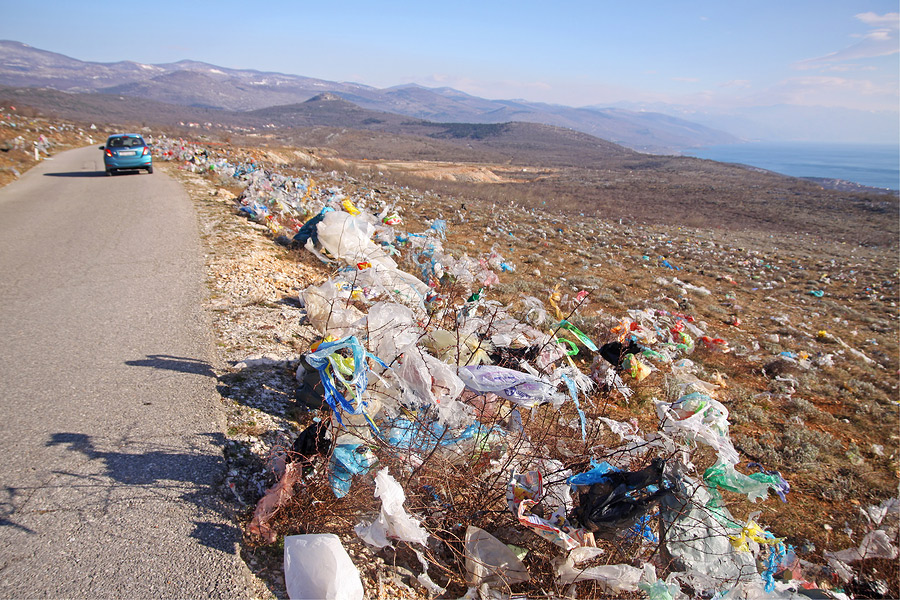What are the Impacts of Single Use Plastic Shopping Bags?
Single use plastic shopping bags are everywhere. They’re in every store you go into, right up front by the cash register, stacked by the thousands. They’re in every household, wadded up and stuffed into a container or another plastic bag – hidden under the sink or in a cupboard. They’re blowing around on the roadside – discarded by careless walkers and drivers. And if you look carefully, you’ll see that they’re even up in the tree tops, carried there by the wind.

Discarded plastic bags along a roadside
And more and more, they’re in the ocean. According to a study published in 2015 in the journal Science, we’re currently depositing between 4.8 and 12.7 million metric tons of plastic waste into the ocean each year.
You might think, “Well, I live in Kansas. My trash isn’t going into the ocean.” But you’d probably be wrong. Single use plastic bags don’t stay intact on their trips to the ocean, so you can’t really see them with your naked eye. Sunlight, wind, and water break the bags into tiny pieces that blow into waterways and make their way to the sea. A study of two rivers in California showed anywhere from 125 to 819 pieces of plastic waste in each square meter of water… and they only counted pieces larger than 4.75mm. Los Angeles and Baltimore have both created trash containment measures on their rivers, to catch as much of this tiny plastic as they can.
Banning the Bag
More and more cities around the U.S. are taking action, to ban plastic bags and limit their communities’ contributions to the bigger issue of plastic in the ocean. The trend is most popular along the coasts, where people routinely see the reality of plastic in the water. California has 67 local ordinances banning single use bags, covering 88 different municipalities. The entire state of Hawaii has adopted bag bans.
And several inland cities are doing their part as well. As an example, 5 different cities in Colorado have adopted ordinances to charge a fee for any disposable shopping bags – and 3 of those cities also banned single use plastic bags.
You can see a full list of local plastic bag ordinances at this link from the Surfrider Foundation: Plastic Bag Bans and Fees
Austin banned all disposable shopping bags back in 2013 – and it was cool to watch the change play out. The bags were gone from stores overnight, and for a short while it was common to see people shuffling out of the grocery store with arms full of loose groceries. The city launched a public service campaign called Bring it Austin to remind people to bring their own reusable bags when they go shopping. It didn’t take long before everyone got the hang of it, and now it’s perfectly commonplace to see families walking into grocery stores and big box stores with their own bags already in hand.
It’s a simple change, with a huge impact.
The Great Plastic Bag Debate
Of course, not everyone’s in agreement on this one. Who would be opposed to cutting down the amount of plastic that goes into our waterways? You guessed it – the plastic industry. They don’t like this change one bit.
They have plenty of information out there about why single use plastic bags are more environmentally responsible than reusable bags. And I’ve heard some information trying to discourage people from using reusable bags because they can contain bacteria.
Personally, I feel like it’s a no-brainer. The single use plastic bags are made from natural gas – a fossil fuel. Many reusable bags are made from cotton – a renewable resource. Of course it’s not quite that simple. A broader discussion would lead us through the ins and outs of GMO cotton, the different chemical compositions of different types of plastics, and the relative toxicity of them all.
But it really is that simple for me. It boils down to this: I’ve never seen a reusable cotton bag suspended up in a tree along the side of the highway, whereas I’ve seen literally hundreds of single use plastic bags in just that place.
What Can You Do to Get Involved?
What can you do to get involved? For starters, grow your own groceries! Food from the grocery store leaves a long trail of fossil fuel exhaust – from international shipping vessels, airplanes, 18-wheelers, and local distribution trucks. The natural gas that goes into the single use plastic bags is just the icing on the cake.
Grow as much of your own food as you can, and you’ll be doing a lot to cut down on the systemic waste.
Purchase some reusable shopping bags, and be a trend-setter. It’s simple to do and it’s an easy adjustment to make in your daily routine. Each time you arrive at a store with reusable bags in hand, someone else might take notice and put some thought into their own “bag habits.” We keep a few bags inside our car so that there is always a spare bag available if we decide to make an impromptu stop for groceries or home goods.
Ten Ways To Rise Above Plastics
This list is borrowed from the Surfrider Foundation’s Plastic Pollution campaign. Here are 10 easy ways to do your part:
#1: Choose to reuse when it comes to shopping bags and bottled water. Cloth bags and metal or glass reusable bottles are available locally at great prices.
#2: Refuse single-serving packaging, excess packaging, straws and other ‘disposable’ plastics. Carry reusable utensils in your purse, backpack or car to use at bbq’s, potlucks or take-out restaurants.
#3: Reduce everyday plastics such as sandwich bags and juice cartons by replacing them with a reusable lunch bag/box that includes a thermos.
#4: Bring your to-go mug with you to the coffee shop, smoothie shop or restaurants that let you use them. A great way to reduce lids, plastic cups and/or plastic-lined cups.
#5: Go digital! No need for plastic cds, dvds and jewel cases when you can buy your music and videos online.
#6: Seek out alternatives to the plastic items that you rely on.
#7: Recycle. If you must use plastic, try to choose #1 (PETE) or #2 (HDPE), which are the most commonly recycled plastics. Avoid plastic bags and polystyrene foam as both typically have very low recycling rates.
#8: Volunteer at a beach cleanup. Surfrider Foundation Chapters often hold cleanups monthly or more frequently.
#9: Support plastic bag bans, polystyrene foam bans and bottle recycling bills.
#10: Spread the word. Talk to your family and friends about why it is important to Rise Above Plastics!
Sources:
• Plastic waste inputs from land into the ocean, Jenna R. Jambeck, et al, Science (http://science.sciencemag.org/content/347/6223/768)
• How Does Your Plastic Bag Get Into the Ocean?, Patrick J. Kiger, Discovery News (http://news.discovery.com/earth/oceans/how-does-your-plastic-bag-get-into-the-ocean-151102.htm)
• Plastic Bags Bans and Fees, Surfrider Foundation (http://www.surfrider.org/pages/plastic-bag-bans-fees)
• The Truth About Plastic Bags, Novolex™ (http://www.bagtheban.com/multimedia/item/the-truth-about-plastic-bags)









COMMENTS(5)
We’ve had a plastic bag tax in the Republic of Ireland for 14 years now. It transformed parts of the countryside, and the UK have copied our system.
I fail to see why any country wouldn’t adopt this since it is now a proven concept.
I hate to see government bureaucrats get involved in anything commonsense.
If the bag banning measures were voted on by citizen and their elected legislatures thats great!
Less plastic makes sense and cents!
Perhaps just start charging for the plastic bags and other items.
Or better yet, advertise how to save by reusing!
It seems like business would want to have less stuff to handle over all, less trash, less employee hours dealing with it.
Make it a win- win – win situation – not heavy handed government….
PS
Where is that photo at the top of the article from?
Have the residents no pride in their land and locale ?
Hi Julie – I’m not sure where that picture was taken. I found it online and I thought it really gets the point across.
Yes, YOU have to get involved for it to work… Why not start today in some small way.?